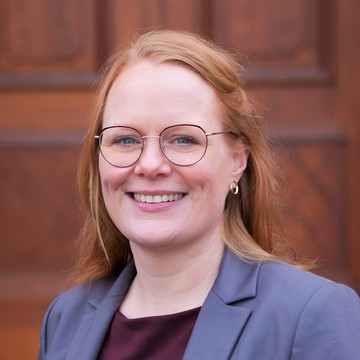Study and Train to Become a Psychotherapist
The master’s program (M.Sc.) in Clinical Psychology and Psychotherapy is the fast track to getting licensed in Psychotherapy
The master’s program in Clinical Psychology and Psychotherapy (hereinafter referred to as: M.Sc. KPPT) was introduced at the University of Mannheim in the fall/
The program
Study and train to become a psychotherapist
The subject-specific focus of the four-semester master’s program is in-depth academic knowledge, profound knowledge of research methods, specific disorders and psychotherapeutic therapies as well as applied psychotherapy work. The degree program implements the requirements for master’s programs set forth in the licensing regulations for psychotherapists (Approbationsordnung) so that you are well prepared for a job in psychotherapy. With the module on health psychology, health prevention and health intervention are added to the psychotherapy-focused curriculum. Students gain valuable knowledge for their future professional activity.
The degree program is very practice-oriented. During your studies, you are already obliged to participate in psychotherapeutic consultations in the modules reflecting the professionally qualifying activity II (berufsqualifizierende Tätigkeit II) – in-depth psychotherapeutic work and the professionally qualifying activity III (berufsqualifizierende Tätigkeit III) – applied psychotherapeutic work, in accordance with the licensing regulations.
Cooperations with psychotherapeutic institutions, whether in inpatient or outpatient care or a partial hospitalization program, ensure the quality of and the access to suitable internship positions.
With a master’s degree in Clinical Psychology and Psychotherapy, you are entitled to submit a request for being admitted to the licensing exam (Zulassung zur Approbationsprüfung) as psychotherapist to the relevant state examination office (Landesprüfungsamt). However, your degree also qualifies you to work in diagnostics and intervention in institutions with a focus on consulting, rehabilitation, or prevention as well as in psychotherapy research and clinical neuropsychology.
Program structure and module catalog
The program structure offers you an overview on your program to help you plan. In the module catalog, you will find everything you need to know about the contents and examination forms of the individual courses and modules.
Professionally qualifying activity III – applied psychotherapeutic practice in accordance with section 18 PsychThApprO
In accordance with section 18 of the licensing regulations for psychotherapists, you are obliged to carry out extensive preparatory professional activities in (partially) inpatient and outpatient care within the scope of professionally qualifying activities III – applied psychotherapy (berufsqualifizierende Tätigkeit IIII) during your master’s program. For the specific regulations, please see the regulations on professionally qualifying activity III – applied psychotherapy work (Ordnung über die berufsqualifizierende Tätigkeit III – angewandte Praxis der Psychotherapie) (This document is only available in German.)
In order to offer you as much flexibility as possible during the third and the fourth semester, the class will be divided into groups for the professionally qualifying activity III (berufsqualifizierende Tätigkeit III), so that all groups complete either the (partially) inpatient or the outpatient part at the same time.
Studying abroad during your master’s program
Please note that mobility on the Master's degree program in Clinical Psychology and Psychotherapy at the University of Mannheim is limited due to the comparatively tightly timed course of study. In this respect, an extension of the standard period of study is unavoidable if you wish to study abroad for one or two semesters. However, this does not mean that a stay abroad during the Master's program at the University of Mannheim is impossible – it just needs to be well planned so that you can complete the curriculum without extending your study time too much. The possibility of recognition of courses completed at the partner university must be checked individually (conformity with the modules and the licensing regulations must be guaranteed).
If you have any questions about studying abroad, please contact the degree program management.
Application
Requirements and Forms for Admission
Admission requirements
If you have not yet completed your bachelor’s degree, you may still apply for a master’s program as long as will provide a proof that you have obtained at least 120 ECTS credits.
- A bachelor’s degree in Psychology which fulfills the requirements under occupational law in accordance with section 9 subsection 4 sentence 5 alternative 1 of the law on the occupation of psychotherapists (PsychThG) or a degree which is considered equivalent to a bachelor’s degree which fulfills the requirements under occupational law in accordance with section 9 subsection 4 sentence 5 alternative 2. The degree must have been obtained at a university or a higher education institution equivalent to a university and correspond to at least 180 ECTS credits or a regular period of study of at least three years.
- The proof of compliance with the requirements under professional law must be provided in the form of a degree certificate, the Transcript of Records or an additional certificate of the higher education institution at which the bachelor’s program has been completed.
- The proof of equivalence must be provided in the form of a certificate of the higher education institution, at which the program has been completed or the Transcript of Records in combination with the module catalog of the completed program.
- Proof of proficiency in German
- A bachelor’s degree in Psychology which fulfills the requirements under occupational law in accordance with section 9 subsection 4 sentence 5 alternative 1 of the law on the occupation of psychotherapists (PsychThG) or a degree which is considered equivalent to a bachelor’s degree which fulfills the requirements under occupational law in accordance with section 9 subsection 4 sentence 5 alternative 2. The degree must have been obtained at a university or a higher education institution equivalent to a university and correspond to at least 180 ECTS credits or a regular period of study of at least three years.
Necessary forms for your application
- Bachelor's degrees in psychology recognized under professional law: Sample degree certificate template (PDF, 112 kB)
- Bachelor's degrees in psychology that are not recognized under professional law (e.g. non-reformed Bachelor's degrees in psychology from Germany, possibly with additional qualifications, or degrees from foreign universities). If you are studying or have studied a Bachelor's degree in psychology abroad or a non-reformed Bachelor's degree in psychology in Germany, possibly with additional qualifications, there is a possibility that your Bachelor's degree can be recognized as equivalent – as long as your degree implements the requirements of the PsychThApprO.
To make it easier for us to check the equivalence, please submit all of the following forms with your application:
- Sample degree certificate template (PDF, 112 kB)
- Appendix 1: Contents of studies (PDF, 230 kB)
- Enclosure 2: Confirmation of orientation internship (PDF, 175 kB)
- Enclosure 3: Confirmation of professionally qualifying activity I (PDF, 213 kB)
Please note: The required documents/
evidence must be completed in full and correctly, as incorrect information will result in the Stuttgart Regional Council refusing admission to the licensing examination and therefore no license to practice medicine. For applicants from non-university higher education institutions: If you are studying at a higher education institution in Germany that is not a university, you must submit proof that your higher education institution is equivalent to a university with your application. The following are accepted as correct proof: Proof of institutional recognition by the German Council of Science and Humanities, note of equivalence (issuing authority + date of notification) on the transcript of records or certificate, a confirmation of equivalence from the higher education institution (issuing authority + date of notification) or a copy of the assessment notice from the ministry of the respective federal state confirming that the home higher education institution is equivalent to a university.
Selection criteria
Selection criteria
- The final grade or – for students still completing their degree – the grade average of the bachelor’s program
- Result of the admission test
- The admission test for the master’s programs in Psychology may be taken at the University of Mannheim.
- Additional qualifications relevant to the program, including:
- practical experience gained in the course of employment, jobs or internships in health care, in an educational or pedagogical field of activity or in research and teaching in these or other areas of Psychology.
- scientific conference contributions and publications.
Information for applicants with a non-reformed Bachelor's degree in Psychology (Germany and abroad): Does my bachelor’s degree program comply with the licensing regulations?
The following information is aimed at students who have studied a non-professionally recognized Bachelor's degree in Psychology. This applies in particular to applicants from abroad, but also to students who have studied a non-reformed Bachelor's degree in Psychology in Germany, possibly with additional qualifications.
In order to be admitted to a Master's degree program in Clinical Psychology and Psychotherapy, you must have completed certain knowledge and internship requirements of the licensing regulations for psychotherapists as part of modules of your regular degree program or in the form of additional qualifications during your Bachelor's degree program.
The relevant modules and internships must have been completed during the Bachelor's degree course, not after it has been completed. Accordingly, it is not possible to obtain admission despite missing (partial) achievements and then make up for them during the Master's degree program!
The following list gives you an overview of what you need to bring with you from your Bachelor's degree in order to fulfill the professional part of the admission requirements for the Master's degree in Psychology Clinical Psychology and Psychotherapy (see also PsychThApprO, §§ 12–15 and Annex 1).
- Fundamentals area:
Fundamentals of psychology for psychotherapists (min. 25 ECTS)
The following areas of knowledge must be covered:
a) General psychology with consideration of cognitive processes in the areas of language, learning, memory, emotion and motivation
b) Differential psychology and personality psychology
c) Developmental psychology
d) Social psychology
e) Biological psychology
f) Cognitive-affective neuroscienceFundamentals of pedagogy for psychotherapists (min. 4 ECTS)
The following areas of knowledge must be covered:
a) upbringing and education
b) the significance of social and cultural factors for educational processes
c) pedagogical interventions and intervention settings
d) legal as well as family and socio-political regulations with effects on educational and psychological interventionsFundamentals of medicine for psychotherapists (min. 4 ECTS)
The following areas of knowledge must be covered:
a) anatomy
b) structure and function of the nervous system
c) selected clinical pictures, in particular internal, neurological, orthopaedic and paediatric clinical pictures
d) biological components of mental disorders and symptoms
e) Genetics and behavioral genetics
f) Basics of somatic differential diagnosticsFundamentals of pharmacology for psychotherapists (at least 2 ECTS)
The following areas of knowledge must be covered:
a) pharmacodynamics
b) Pharmacokinetics
c) Psychopharmaceuticals
d) Pharmaceuticals- Specialization in Clinical Psychology and Psychotherapy:
Disorder Theory (min. 8 ECTS)
The following areas of knowledge must be covered:
(a) general and specific pathology of mental and psychologically co-related disorders in childhood, adolescence and adulthood, including infancy, early childhood and older age
b) Epidemiology and comorbidity
c) clinical-psychological diagnosis and classification
d) Models of the development, maintenance and course of mental and psychologically related disorders in childhood, adolescence and adulthood, including infancy, early childhood and adulthood, taking into account the different disorder models of scientifically tested and recognized psychotherapeutic procedures and methodsGeneral psychotherapy procedures (at least 8 ECTS)
The following areas of knowledge must be covered:
a) the scientifically tested and recognized psychotherapeutic procedures and methods
b) recognized characteristics for the evaluation of scientific evidence of scientifically tested and recognized psychotherapeutic procedures and methods as well as evidence-based new developmentsPreventive and rehabilitative concepts of psychotherap. Action (min. 2 ECTS)
The following areas of knowledge must be covered:
a) characteristics and function of prevention and rehabilitation, taking into account the concerns of different age and patient groups
b) Prevention programs and rehabilitation approaches, taking into account the needs of different age and patient groupsProfessional ethics and professional law (at least 2 ECTS)
The following areas of knowledge must be covered:
a) ethics in research and practice
b) professional legal requirements of psychotherapeutic action
c) social law requirements for psychotherapeutic care- Methods and diagnostics:
Scientific methodology (without Empra/
Expra!) (min. 15 ECTS)
The following areas of knowledge must be covered:
a) History of psychology and psychotherapy
b) Methods and scientific concepts for researching human behavior and experience including epidemiological research, methods for patient observation
c) descriptive and inferential statistics as well as statistical methods of evaluation research
d) planning and conducting scientific studies
e) Data collection and data analysis using digital technologiesPsychological diagnostics (min. 12 ECTS)
The following areas of knowledge must be covered:
(a) general diagnostic procedures and methods
b) diagnostic procedures and methods for behavioral observation, including procedures and methods for patient observation
c) indications and diagnostic processes in people of all ages and patient groups
d) characteristics of classification systems including their sources of error
e) psychometric principles of measurement as a prerequisite for test theories and test constructions
f) Psychological and psychopathological assessment taking into account differential diagnostic findings
g) Language and interaction in the diagnostic process as well as interviewing methods- Practical work placements / internships:
Research-oriented internship I – basics of research according to §13 PsychThApprO (experimental psychology internship/
empirical internship, min. 6 ECTS)
The following criteria must be met:
a) takes place in research facilities at the university or at research facilities that cooperate with the university
b) is carried out under qualified supervision and in small groups (max. 15 participants). The course is carried out in blocks or during the course of study.
c) students must also actively participate in exemplary scientific studies and contribute to their planning and implementation.Orientation internship according to § 14 PsychThApprO (min. 5 ECTS, min. 4 weeks/
min. 150 hours)
The following criteria must be met:
a) takes place in interdisciplinary healthcare facilities or
in other facilities in which counseling, prevention or rehabilitation for the maintenance, promotion and restoration of mental health are carried out. The support or guidance must be provided by one of the following groups of people Psychotherapists, psychological psychotherapists, child and adolescent psychotherapists, psychologists, medical specialists or psychotherapists in training (PiAs).You can also find a checklist of the requirements for the orientation internship on the website of our internship office (currently being updated).
Professionally qualifying activity I according to §15 PsychThApprO (min. 8 ECTS, min. 6 weeks and 2 days/
min. 240 hours)
The following criteria must be met:
(a) BQT I may take place in the following institutions or areas, provided that psychotherapists*, psychological psychotherapists* or child and adolescent psychotherapists* work there:
1. in psychotherapeutic, psychiatric, psychosomatic or neuropsychological care facilities
2. in prevention or rehabilitation facilities that are comparable to the facilities mentioned in number 1
3. in facilities for people with disabilities
4. in other areas of institutional careb) BQT I must have been carried out under qualified supervision
c) at least 60 ECTS credits must have been acquired before completing BQT I.
You can also find a checklist of the requirements for BQT I on the website of our Internship Office.
Important information for prospective students from abroad: Psychotherapists, psychological psychotherapists or child and adolescent psychotherapists licensed in Germany must work in the institutions where internships have been completed that are to be recognized as equivalent to the BQT I!
Degrees obtained abroad
In principle, it is still possible to switch to a German M.Sc. in Psychology with a focus on Clinical Psychology and Psychotherapy with a Bachelor's degree in Psychology obtained abroad, but this will be more difficult than before. The prerequisite for admission is that the degree course completed at the foreign university meets the requirements or content of the licensing regulations and the decisive factor is the extent to which the achievements of the foreign Bachelor's degree course can be recognized as equivalent – this is ultimately in the hands of the responsible health authorities, usually the state examination offices. The recognition of internships completed abroad could be particularly critical at the present time – especially the internship that is to be recognized as a professional qualification I. This is because the internship must not only be completed during the study period abroad: This is because the internship must not only have been completed during the period of study, but also in relevant institutions in which psychotherapists, psychological psychotherapists or child and adolescent psychotherapists who have received their license to practice in Germany work (see PsychThApprO, §15).
In the worst case, your achievements from the Bachelor's degree obtained abroad will not be recognized, so that you will have to complete another Bachelor's degree in Germany that has been redesigned in accordance with the psychotherapy reform.Admissions test
The admission test is an optional selection criterion for the additional verification of the subject-specific capability. Knowledge acquired in a bachelor’s program in Psychology or an equivalent program are a requirement for processing. The test is offered once a year and is valid for the application year in which it was taken.
Study-relevant additional qualifications
A maximum of 20 additional points can be achieved for study-relevant additional qualifications. All achievements that meet the following criteria will be assessed:
- Practical professional experience
- Practical professional experience gained in the context of professional activities, jobs or internships in the following application areas of psychology,health care, in an educational or pedagogical field of activity or in research and teachingin these or other areas of psychology will be taken into account.
- Time component & scoring: A maximum of 10 points can be awarded for practical professional experience. Activities are considered with the following number of points if they have been completed and proven to the following extent by the time of application:
- At least 150 working hours: 2 points,
- At least 300 working hours: 4 points,
- At least 450 working hours: 6 points.
- Evidence to be provided: Certificates and proofs such as the “Proof of extracurricular achievements” provided by the Application and Admissions Office of the University of Mannheim are accepted as proof; employment contracts and other documents declaring the intention to take up practical work experience are not accepted. All evidence must be submitted with the application.
- Scientific conference contributions and publications
- A maximum of 20 points can be awarded for scientific conference contributions and publications. Contributions will be considered up to the following points if they have at least been accepted for publication (not “under review”, not “revise and resubmit”) by the time of application and fall into one of the following categories:
- Conference contribution at a scientific psychology conference with up to 10 points; internal university conferences or conferences of university-owned research institutes are excluded;
- Publication in a peer-reviewed scientific journal with up to 20 points.
- The following submissions are accepted as evidence:
- For conference contributions at a scientific psychology conference, excerpts from the conference proceedings (abstract book) and/
or a confirmation of the conference contribution in text form from the conference organizer will be accepted. All other forms of proof, such as written confirmations from co-authors, a reference in the curriculum vitae, mentions in work and/ or internship certificates and/ or letters of recommendation are not sufficient; - for publications already published in peer-reviewed scientific journals, a precise description and citation of the publication must be provided as proof; for publications accepted for publication in peer-reviewed scientific journals, confirmation from the editor of the journal that the publication has been published in text form serves as proof. All other forms of proof, such as written confirmations from co-authors, a picture in the CV, mentions in work and/
or internship certificates and/ or letters of recommendation, for example, are not sufficient as proof. - All evidence must be submitted with the application.
- For conference contributions at a scientific psychology conference, excerpts from the conference proceedings (abstract book) and/
- A maximum of 20 points can be awarded for scientific conference contributions and publications. Contributions will be considered up to the following points if they have at least been accepted for publication (not “under review”, not “revise and resubmit”) by the time of application and fall into one of the following categories:
- Practical professional experience
How to apply
The application period for the current application year can be found here.
An application for the M.Sc. in Clinical Psychology and Psychotherapy is generally only possible for the respective fall/
winter semester. Please submit your application online to the University of Mannheim. If you have any questions about the application process, please contact the Admissions Office.
Academic advising
Still have questions? We are happy to help!
The program managers of the master’s program in Clinical Psychology and Psychotherapy are happy to answer any questions you may have on the program (for example, on the contents or the structure).
If you have questions about the admissions process, please contact the admissions office.

Dr. Anika Skotak (she/her)
School of Social Sciences
A 5, 6
Building A – Room A 416
68159 Mannheim
Tuesdays, 10–11 am:
Online office hour via Teams
Please make an appointment:
https://www.sowi.uni-mannheim.de/en/consultation/anika-skotak/
Wednesdays, 1–1.30 pm:
Open telephone consultation hour
Tuesdays and Wednesdays, 09.00am – 2.00pm
Dr. Laura-Ashley Fraunfelter (she/her)
Fakultät für Sozialwissenschaften und Otto-Selz-Institut
L 13, 15–17
68161 Mannheim
Admissions Office
 Credit: Anna Logue
Credit: Anna LogueAdmissions Office
University of Mannheim
L 1, 1 – Room 157, 158
68161 MannheimGeneral advice for international students
 Credit: Katrin Glückler
Credit: Katrin GlücklerSolrun Graham-Parker (she/her)
Advisor Study Success International Degree-Seeking Students, Coordinator Made in Mannheim – FIT for StudiesUniversity of Mannheim
Division II – Student Affairs
International Office
L 1, 1 – Room 108
68161 MannheimConsultation hour(s):
Book an appointment for an individual consultation:
https://www.uni-mannheim.de/en/about/centers-institutions-affiliates-and-partners/international-office/consultation-hours-international-degree-seeking-students/Office hours:
Visit my office without an appointment on Tuesdays from 9–11 a.m. (open office hours).
